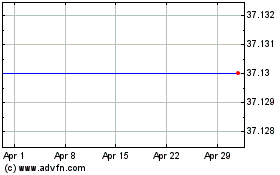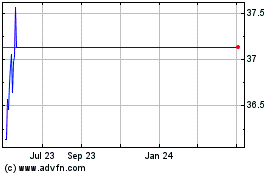ABB Bets Simplified Structure Will Cut Costs, Boost Profit
January 09 2019 - 6:36PM
Dow Jones News
By Tatyana Shumsky
Industrial giant ABB Ltd. is putting more power in the hands of
its business leaders and reducing head count at its corporate
office in a bid to boost its profit margin and cut $500 million a
year in costs.
ABB in December sold its power-grid unit to Japan's Hitachi Ltd.
in a deal that values the unit at $11 billion. ABB also announced
it would scrap country and regional structures across its remaining
business lines -- electrification, industrial automation, robotics
and discrete automation and motion.
As part of the restructuring, the Swiss conglomerate gave
business unit leaders ownership of products, functions, research
and technology and territories. By placing control in the hands of
business-unit leaders, the thinking goes, decision-making will
become more nimble due to minimized corporate interference and the
elimination of duplicative functions.
"We're going towards a fully global entrepreneur model," Chief
Executive Ulrich Spiesshofer told CFO Journal on Wednesday. "That's
really a massive, massive change to the operational DNA of
ABB."
For decades, ABB's country-level and regional managers were
responsible for profit and loss. That approach put ground-level
focus on optimization, but it also precluded taking a global view
on the business, Mr. Spiesshofer said.
"We want to have absolutely clear responsibilities," he said.
"People need to own a business and they need to have global,
undiluted responsibility to run their businesses, set priorities
and really make sure you're lined up against competition."
Staff at ABB's headquarters, already halved during Mr.
Spiesshofer's tenure, will be reduced further as part of the
restructuring. More cuts are likely as the company roots out
duplicative activities across its country-level offices, he
said.
ABB hopes to retrain and redistribute many of those employees
into open positions throughout the company, Mr. Spiesshofer
said.
It costs ABB roughly EUR100,000 ($115,450) to lay off an
employee in Germany, compared with about EUR35,000 to retrain them,
Mr. Spiesshofer said.
Analysts and investors have largely welcomed ABB's moves, in
part because the industrial giant plans to redistribute its net
cash proceeds of roughly $7.6 billion to investors through a stock
buyback once the first stage of the Hitachi transaction closes in
the first half of 2020.
"Management's commitment to redistribute the cash proceeds to
shareholders should come as a major relief for those who were
concerned about potential reinvestment risks," analysts at Deutsche
Bank AG said in a recent note to investors.
Lars Förberg, co-founder of activist investment fund Cevian
Capital and member of ABB's board, said focusing ABB's portfolio on
digital industries was key. "Further simplifying the business
creates a better company and a strong basis for long-term growth,"
he said in a statement in last month.
Since 2016, ABB has invested roughly EUR100 million a year on a
companywide digital platform, which includes its data analytics and
artificial-intelligence capabilities, Mr. Spiesshofer said.
The platform, overseen by ABB's chief digital officer, gives
each business unit access to computing and analytics resources
without single-handedly shouldering the cost of developing and
maintaining the infrastructure.
"When you do remote condition monitoring on hundreds of
thousands of robots, when you do that on motors, when you do it on
buildings, all from the same platform, you get completely different
leverage of your cost to serve than any of the focused
competitors," he said.
Write to Tatyana Shumsky at tatyana.shumsky@wsj.com
(END) Dow Jones Newswires
January 09, 2019 18:21 ET (23:21 GMT)
Copyright (c) 2019 Dow Jones & Company, Inc.
ABB (NYSE:ABB)
Historical Stock Chart
From Mar 2024 to Apr 2024

ABB (NYSE:ABB)
Historical Stock Chart
From Apr 2023 to Apr 2024
